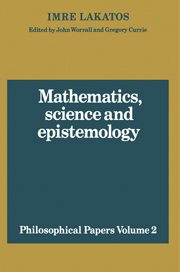Book contents
- Frontmatter
- Contents
- Editors' introduction
- PART 1 PHILOSOPHY OF MATHEMATICS
- 1 Infinite regress and foundations of mathematics
- 2 A renaissance of empiricism in the recent philosophy of mathematics?
- 3 Cauchy and the continuum: the significance of non-standard analysis for the history and philosophy of mathematics (edited by J. P. Cleave)
- 4 What does a mathematical proof prove?
- 5 The method of analysis-synthesis
- PART 2 CRITICAL PAPERS
- PART 3 SCIENCE AND EDUCATION
- References
- Lakatos bibliography
- Indexes
1 - Infinite regress and foundations of mathematics
Published online by Cambridge University Press: 09 January 2010
- Frontmatter
- Contents
- Editors' introduction
- PART 1 PHILOSOPHY OF MATHEMATICS
- 1 Infinite regress and foundations of mathematics
- 2 A renaissance of empiricism in the recent philosophy of mathematics?
- 3 Cauchy and the continuum: the significance of non-standard analysis for the history and philosophy of mathematics (edited by J. P. Cleave)
- 4 What does a mathematical proof prove?
- 5 The method of analysis-synthesis
- PART 2 CRITICAL PAPERS
- PART 3 SCIENCE AND EDUCATION
- References
- Lakatos bibliography
- Indexes
Summary
INTRODUCTION
[Sceptical philosophy has been teaching for more than two thousand years that it is impossible to achieve either the aim of conclusively establishing meaning or the aim of conclusively establishing truth. But to establish the meaning and truth of mathematics is precisely the aim of ‘ foundations’.]
The classical sceptical argument is based on the infinite regress. One can try to pin down the meaning of a term either by defining it in other terms – this leads to infinite regress – or by defining it in ‘perfectly well-known terms’. But are the four terms of the expression ‘perfectly well-known terms’ really all perfectly well-known terms? One sees that the abyss of infinite regress opens up again. How then could mathematical philosophy still claim that in mathematics we have or we should have exact concepts? How does it hope to avoid the sceptics' strictures? How can it claim that it has offered foundations of mathematics – logicist, meta-mathematical or intuitionist? But even allowing for ‘exact’ concepts, how can we prove that a proposition is true? How can we avoid the infinite regress in proofs, even if we could avoid the infinite regress in definitions? Meaning and truth can only be transferred, but not established. But if so, how can we know?
This controversy between dogmatists – who claim that we can know – and sceptics – who claim that we either cannot know or at least cannot know that we can know and when we can know – is the basic issue in epistemology.
- Type
- Chapter
- Information
- Mathematics, Science and Epistemology , pp. 3 - 23Publisher: Cambridge University PressPrint publication year: 1978
- 8
- Cited by



